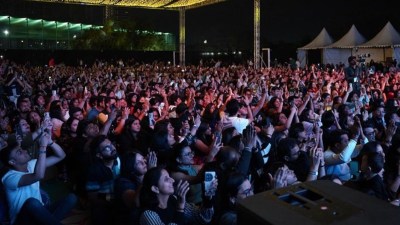Legislature can enact fresh law, can’t directly overrule court judgment: CJI
The CJI said the fact that Judges are not elected is a “strength of our process”, not a “deficiency”.
 On improving people’s access to justice, the CJI said language is a barrier and the SC has taken steps to translate judgments into regional languages. (PTI/File)
On improving people’s access to justice, the CJI said language is a barrier and the SC has taken steps to translate judgments into regional languages. (PTI/File) SPEAKING ON the separation of powers between the executive, legislature and judiciary, Chief Justice of India D Y Chandrachud said on Saturday that while the legislature can enact a fresh law to “cure the deficiency” in a law, it cannot “directly overrule” a court judgment.
“There is a dividing line between what the legislature can do and what the legislature cannot do when there is a judgment of the court. If there is a judgment of the court which decides a particular issue and that judgment points out deficiencies in the law, it is always open to the legislature to enact a fresh law to cure the deficiency. What the legislature cannot do is to say we think this judgment is wrong and therefore we overrule the judgment. A judgment of the court cannot be directly overruled by the legislature… that’s completely impermissible… but if a judgment takes a particular view of a legislation, it is always open to the legislature to cure the defect,” he said at the Hindustan Times Leadership Summit.
The CJI said that in 1951, when the SC held that provisions for reservation would not extend to educational institutions, the Parliament amended the law to bring reservation in educational institutions.
Saying that “Judges don’t look at how society will respond when they decide cases”, the CJI said: “That’s exactly the distinction between the elected arm of government and the judiciary. The elected arm of the government is, and is intended to be, responsive to people”. He said Judges are guided by constitutional morality, not popular morality.
He said the fact that Judges are not elected is a “strength of our process”, not a “deficiency”. “The reason… is there are certain abiding or eternal values which a society must stand for, particularly a society like ours which is governed by a social transformative instrument like the Constitution. And because there are certain eternal or abiding values (and) the courts are entrusted with the duty to protect those values,” he said.
Responding to queries about the inadequate representation of women and marginalised communities in the judiciary, the CJI said: “There are structural barriers at the very point of entry into the legal profession” which need to be addressed.
For instance, he said, CLAT (Common Law Admission Test) is mostly conducted in English. “They are urban-centric, and they privilege the already privileged in our society. So, right at the entrance level, the parameters that we lay down are loaded against those who do not have access to a good English-based education. Once you enter the profession, you have barriers all over again, for instance entry into chambers of senior counsel does not follow merit. It’s an old boys’ club,” he said.
The CJI, however, said gradual changes were being seen. “In the recruitment of district judiciary across India, more women are being recruited than men. If you look at the National Law Schools, more women are entering the classes than men… which really means that if you open up a level playing field for women, they are capable of gaining entry into the institutions of governance. We need to create that level playing field for women,” he said.
The CJI said courts perform three important functions, starting with the cases they decide. “Courts have also become important platforms for social engagement, not just for the verdicts which we deliver but for the fact that we create a space for reasoned dialogue between diverse segments of society,” he said, adding that the “less-known fact is the work which we do in our administrative capacity, which is extremely crucial”.
On improving people’s access to justice, the CJI said language is a barrier and the SC has taken steps to translate judgments into regional languages. “The idea is courts must reach out to people,” he said. Holding hearings via video conferencing and producing transcripts of Constitution Bench hearings were part of the process to improve accessibility, he said.
“The idea behind doing this is to create a greater degree of transparency and accountability in the work of the court,” he said, adding that “technology which we have deployed in the judicial system is democratising access to justice”.
Responding to a question on whether 65 years was too young for Supreme Court Judges to retire, the CJI said it was for the Parliament to decide. “It is important that Judges must retire. It is too much of a responsibility for human beings. Judges are human beings…you must pass on the mantle to succeeding generations who would be able to point out errors of the past and rejig legal principles for society to evolve… Because to give that sort of power to unelected judges to continue for life, in the Indian context, it is wisely not adopted by the Indian Constitution.”







